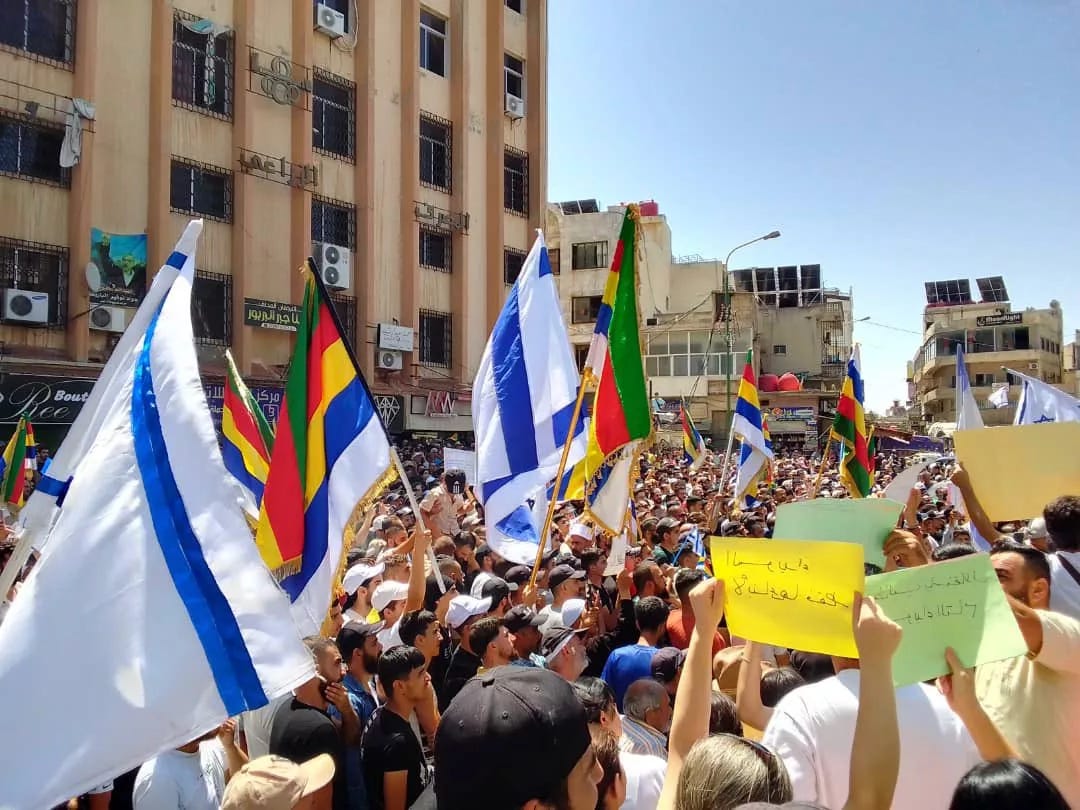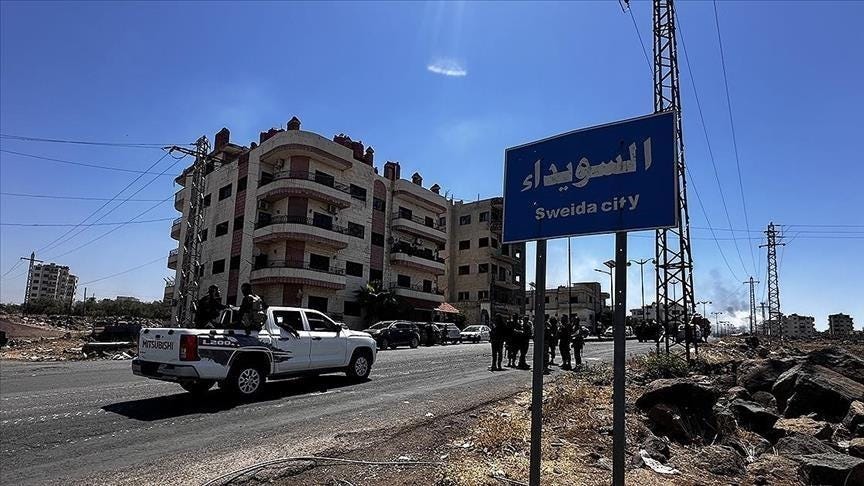In an unprecedented development, Syria’s southern province of Suwayda has witnessed demonstrations demanding “complete independence from Syria and the right to self-determination,” with protesters waving both Israeli flags and flags of the Druze community. This marks the first time calls for full secession from Syria have been made so explicitly on the streets.
The protests, held on August 16, firmly rejected the ideas of federalism and decentralization, instead stressing the demand for full independence. These demonstrations came just four days after a joint Jordanian-Syrian-American meeting, which reaffirmed that Suwayda is an integral part of Syria and emphasized the importance of safeguarding the rights and representation of its people in shaping the country's future.
This sharp escalation in rhetoric follows deadly clashes in Suwayda in July, which included human rights violations committed by both Druze and Bedouin factions, as well as government security forces. The spiritual leader of the Druze community, Sheikh Hikmat al-Hijri, repeatedly called for “international protection” and even appealed to Israel for intervention.
The call for independence further complicates the already fraught situation in southern Syria and narrows the prospects for dialogue—particularly in light of direct Israeli involvement, including airstrikes targeting Syrian security forces and reaching sensitive sites in Damascus. These developments have intensified the crisis and raised the stakes for both Suwayda and Syria as a whole.
A Complex Reality in Suwayda
Following the fall of Bashar al-Assad’s regime on December 8, 2024, Sheikh Hikmat al-Hijri refrained from immediately taking a definitive stance toward the new Syrian administration. Over time, however, he grew increasingly critical, labeling it as exclusionary and unrepresentative of Suwayda’s people, and referring to it as a “terrorist, one-color government.”
The Druze religious leadership in Suwayda became divided in its stance toward the government. Tensions escalated further after a national dialogue conference organized by the government in February. Al-Hijri, in response, called for international intervention to ensure that the process yields a civil state founded on the separation of powers and the rule of law.
By mid-July, violent confrontations had erupted in Suwayda, resulting in the deaths of at least 1,013 Syrians from all sides, according to the Syrian Network for Human Rights. The clashes involved local factions, government forces, and Bedouin tribal groups, alongside Israeli strikes targeting Syrian military positions.
Despite multiple ceasefire announcements, the fighting persisted, prompting international and regional mediation that culminated in a new agreement between Syria and Israel, brokered by the United States and endorsed by Turkey, Jordan, and other neighboring states, on July 19.
On August 9, the three senior Druze religious leaders in Suwayda issued statements opposing the Syrian government, with Sheikh Yusuf Jarbou’ and Sheikh Hammoud al-Hanawi aligning their positions with that of Sheikh al-Hijri.
Trilateral Meeting to Contain the Crisis
In a bid to de-escalate tensions, a tripartite meeting was held on August 12 in the Jordanian capital, Amman, involving Syrian Foreign Minister Asaad al-Shibani, his Jordanian counterpart Ayman Safadi, and U.S. Special Envoy for Syria Thomas Barak.
The meeting concluded with an agreement to form a trilateral working group comprising Damascus, Amman, and Washington to support the Syrian government's efforts to stabilize Suwayda and enforce the ceasefire.
The parties reaffirmed Suwayda’s status as an inseparable part of Syria and pledged to ensure its residents’ rights and representation. The Syrian government also committed to:
Conducting comprehensive investigations and holding all perpetrators of crimes and violations accountable;
Cooperating with relevant UN agencies in the investigation process;
Increasing the flow of humanitarian aid throughout Suwayda, in coordination with the UN;
Restoring disrupted public services and rehabilitating affected areas;
Welcoming international contributions to support these efforts;
Facilitating the return of displaced residents;
Initiating community reconciliation processes to restore civil peace.
This meeting built upon the Amman talks held on July 19, which initially produced the ceasefire agreement.
Government Perspective on Secession
Although calls for secession had not previously been voiced so overtly, Sheikh al-Hijri denied seeking independence as recently as March. However, recent developments suggest a growing inclination toward organized rebellion or even separation.
In a move reflecting this shift, Al-Jumhuriya Net reported that Khaldoun al-Hijri, a relative of Sheikh al-Hijri and his representative abroad, met with U.S. officials in Washington in February 2025.
He reportedly proposed a plan for armed rebellion against President Ahmad al-Shara’s government, to be led by Druze forces in Suwayda, in coordination with the Syrian Democratic Forces (SDF) in the east and Alawite factions from the coastal region, with Israeli backing.
From the outset, the transitional military administration that ousted Assad had emphasized Syria’s territorial unity. President Ahmad al-Shara has reiterated this point, stating that the transitional government is committed to restoring full national sovereignty under a single, unified authority.
During a meeting with community leaders from Idlib on August 13, al-Shara dismissed the notion of Syria’s division, stating, “There is no real threat of partition—only desires by some to create cantons. But politically, logically, and traditionally, such a scenario is impossible.”
Al-Shara argued that partition is virtually unfeasible in Syria, warning that redrawing borders could trigger similar crises in other countries. He described advocates of partition as politically naive dreamers, saying such ideas often lead to disastrous consequences.
He accused some groups of seeking support from regional powers like Israel to pursue division, but stressed the near impossibility of such plans, particularly in the densely populated south. “Any invader would have to station a policeman at every doorstep,” he remarked.
“Marginal Voices Influenced by Violations”
The independence protests took place in Karama Square and in the northern town of Shahba. Many observers argue that these demonstrations do not reflect the majority view in Suwayda but are instead a reaction to abuses by government forces.
There have been increasing reports of a crackdown on dissenting voices opposed to Sheikh al-Hijri’s position. “Syria Now” reported that armed groups loyal to al-Hijri stormed two Druze religious shrines in Ain al-Zaman and Sahwat al-Blat, assaulted Sheikhs Jarbou’ and al-Hanawi, and raised Israeli flags and photos of al-Hijri over the shrines.
Political analyst Darwish Khalifa told NoonPost that the heated rhetoric and mutual accusations among various Syrian factions exacerbated by polarizing discourse on social media have created a charged atmosphere in Suwayda, fostering calls for internationalization of the crisis and fueling secessionist sentiments among some in the Druze community.
However, Khalifa stressed that these demands do not reflect the views of Suwayda’s broader population, which includes Druze, Christians, and tribal groups. He noted that previous unrest in Druze-populated areas such as Jaramana, Sahnaya, and parts of the coastal region has heightened concerns among other communities about their future in the new Syria.
Political analyst and Jusoor Center executive director Wael Alwan argued that current developments in Suwayda should not be seen as genuine calls for independence. Instead, he described them as predictable reactions from certain local segments in the wake of intense violence.
Israel’s Leverage in Negotiations
Israel remains one of the most influential external actors in southern Syria. Since Assad’s fall, Israel has stepped up its military operations in Syria, citing various concerns including the need to prevent weapons from falling into extremist hands, protect its citizens, and counter rising Turkish influence.
During recent clashes in Jaramana, Sahnaya, and Suwayda in May, Israel invoked its commitment to “protect the Druze” and launched multiple airstrikes. Its involvement intensified again after the latest Suwayda clashes.
Amid these developments, reports emerged of secret negotiations between Syria and Israel. On July 7, U.S. envoy Thomas Barak confirmed that the Syrian government had initiated dialogue with Israel.
A follow-up meeting between Syrian and Israeli officials took place on July 24, lasting four hours and focusing on security arrangements in southern Syria. It marked the highest-level contact between the two sides in over 25 years.
According to Alwan, Israel is leveraging the Suwayda crisis as a bargaining chip in ongoing negotiations. He doubts there’s a serious push for separation or formal ties with Israel, describing the involvement as “tactical” rather than strategic.
He emphasized that while Israel sees political value in exploiting the current climate especially amid negotiations it is unlikely to translate into lasting political or social consequences in Syria, particularly if the crisis is seen as circumstantial.
Khalifa, meanwhile, warned that Israel is pursuing a broader strategy of demographic fragmentation in Syria, noting that the Netanyahu government places particular emphasis on the Druze population due to its proximity and the presence of approximately 150,000 Druze citizens in Israel, some 15% of whom serve in the military.
Dialogue as a Path Forward
President al-Shara emphasized that local governance in Suwayda and elsewhere must be grounded in national unity and disarmament under state authority, while leaving room for dialogue on other matters.
In a television interview on August 16, presidential media adviser Ahmad Muwaffaq Zaidan reaffirmed that the government’s position is one of reconciliation and negotiation. He called on Syria’s intellectual elite to recognize the dangers posed by secessionist demands and work toward a national consensus.
Alwan argued that Suwayda’s crisis requires broad engagement, not just from the central government but also from civil society, which he sees as the missing actor in Syria’s political transformation. He stressed the need for genuine, inclusive dialogue that could pave the way for a sustainable solution.
He also emphasized the importance of civil society’s role in shaping Syria’s new social contract and constitution, asserting that it must play a central part in rebuilding the nation.
Khalifa, for his part, called on the Syrian government to quickly launch a comprehensive national initiative to rebuild trust across all communities. He proposed an internationally guaranteed political process, starting with a binding national dialogue and transitional justice framework, alongside drafting a new constitution that guarantees basic rights and individual freedoms.
He urged the government to present this vision ahead of President al-Shara’s upcoming address at the United Nations General Assembly in September, warning that failure to act swiftly could encourage more separatist movements and foreign interventions further threatening Syria’s fragile national fabric.





